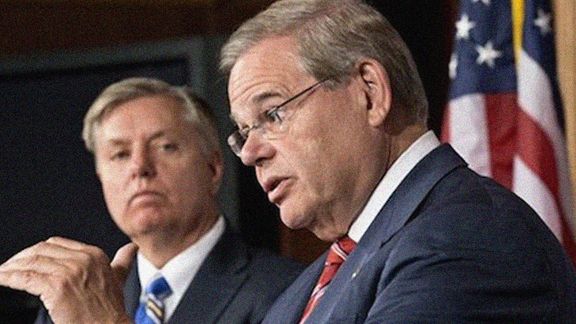Senators’ Call For Zero Enrichment Highlights Fears Over Iran Talks

In opposing revival of the 2015 Iran nuclear deal, United States senators Lindsey Graham and Robert Menendez have demanded Tehran end any uranium enrichment.

In opposing revival of the 2015 Iran nuclear deal, United States senators Lindsey Graham and Robert Menendez have demanded Tehran end any uranium enrichment.
Speaking at a press conference in Jerusalem Monday, the two senators highlighted an earlier plan that the US ‘allow’ Iran and other Middle Eastern states to have nuclear power provided all enrichment takes place outside the region.
Graham and Menendez have been in Israel as part of a senate delegation. Menendez, a Democrat and consistent opponent of the 2015 Iran nuclear deal, chairs the Senate Foreign Relations committee, whereas Graham is a staunch supporter of Donald Trump and has recently spoken of “riots in the streets” should the former president be prosecuted.
The US pressed that Iran end uranium enrichment at the time of Europe-Iran talks 2003-05. While Tehran at that time suspended enrichment as a ‘goodwill gesture,’ it refused to give up a ‘right’ it said was enshrined in the Nuclear Non-Proliferation Treaty.
When Trump in 2018 withdrew the US from the 2015 deal – the JCPOA, Joint Comprehensive Plan of Action – ending uranium enrichment was one of 12 demands stated as aims of ‘maximum pressure’ sanctions.
Washington’s links with Europe
While Iran greatly expand its nuclear program since February 2021, the administration of President Joe Biden has sought to mend Washington’s links with Europe, damaged under Trump, and to take a joint approach over Iran with the three European JCPOA signatories – France, Germany and the United Kingdom, the ‘E3.’
While the US reviving a demand for zero enrichment could strain relations with the E3, and for sure with Russia and China, the Biden administration has found itself in talks with an Iran emboldened by surviving ‘maximum pressure’ and by its nuclear expansion. And while nuclear policy is set collectively under supreme leader Ali Khamenei, the President Ebrahim Raisi, who took office in August 2021, is less inclined to compromise than Hassan Rouhani, president when the JCPOA was signed in 2015.
Biden officials expressed disappointment at Iran’s latest input into what has effectively become US-Iran bilateral ‘ping pong diplomacy’ since the European Union proposed August 8 its ‘final text’ for restoring the JCPOA. Showing clear disappointment, Josep Borrell, the EU foreign policy chief, said Monday that without “convergence…the whole process is in danger.”
Deficiencies in the text?
JCPOA opponents in the US, as well as some observers, have highlighted what they see as shortfalls in the proposed text – with the slow pace of talks encouraging both speculation and leaks.
Laurence Norman, correspondent for the Wall Street Journal, highlighted in a Monday tweet a claim that the draft agreement would give the International Atomic Energy Agency (IAEA) only 60 days, between agreement being signed and ‘Reimplementation Day,’ to examine 18 months of data that the agency has not seen since Iran restricted IAEA access in February 2021.
The US-E3 position is that technical IAEA issues are separate from the ’political’ revival of the JCPOA. But Iranian leaders have publicly demanded an IAEA probe into unexplained uranium traces be dropped before the 2015 nuclear deal is restored, so the US and Iran have apparently struggled to find a suitable form of words to bridge the gap.
Menendez said at the press conference Monday he was unsure if a Congressional review of a revived JCPOA, which is required under the 2015 Iran Nuclear Agreement Review Act, could lead to any agreement being blocked. Menendez said the foreign relations committee would have hearings, but whether a vote in the Senate and House of Representatives would meet “the threshold under the law to nullify that agreement is another question.”
A majority vote in both houses could be vetoed by the president. The balance of either house, given the current volatility in US politics, remains in doubt although recent polls show the Democrats, generally more sympathetic to the JCPOA, gaining some momentum.